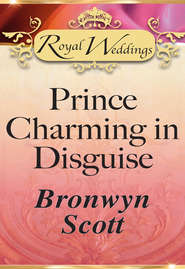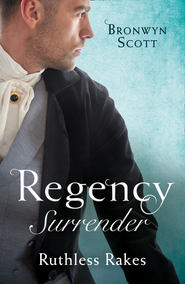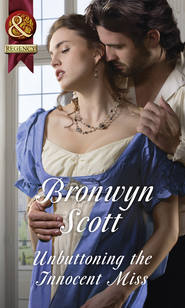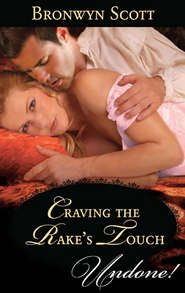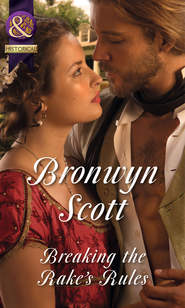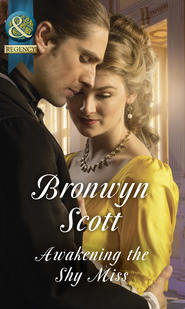По всем вопросам обращайтесь на: info@litportal.ru
(©) 2003-2024.
✖
A Marriage Deal With The Viscount
Автор
Год написания книги
2019
Настройки чтения
Размер шрифта
Высота строк
Поля
‘Yes.’ The Duke gave an elegant shrug. ‘She does business under the name of Phillip Barnham.’
‘And you keep her secret?’ Conall probed, understanding the depth of trust the Duke displayed in telling him. It was the kind of confidence entrusted to family.
‘She is a woman who has led a gilded but unfortunate life. Society has not judged her kindly for it. If I do not keep her secret, if you do not keep her secret, she would have no honourable recourse for supporting herself.’ In other words, the board didn’t know.
‘The Great Exhibition owes its success to the efforts of many, not the least of which were her contributions, under her alias, in bringing certain key inventions from the Continent to be displayed here,’ the Duke explained, perhaps to build her credibility with him. Conall knew Cowden had been heavily involved in the Great Exhibition. No doubt he’d been impressed. La Marchesa’s connections and business acumen had been recommendation enough to take her on as a secret partner to the club. ‘I would not want her exposed, Taunton, nor would I want you misled. You see why I hesitate on both your behalves?’
And yet, Conall could not do the same. He did not have the luxury of hesitation, not with seventy-five head of alpaca and his people waiting on him. If Cowden trusted La Marchesa, that would have to be good enough for him. He had no choice but to go forward. ‘How shall I contact her?’
Cowden smiled broadly. ‘You’re in luck. She is here for tea today. She’s in the drawing room with my wife and daughter-in-law.’ Conall wondered how much luck had to do with it. The Duke cleared his throat, perhaps sensing the question of coincidence. ‘She’s here for Ferris’s wedding, nothing more, as a favour to my daughter-in-law.’ The daughter-in-law with four sons, Conall reminded himself.
The Duke dropped his voice. ‘There’s something else you should know. La Marchesa has something of a reputation. But the two of them go way back to finishing-school days.’ He splayed his hands in a gesture of happy surrender that Conall surmised to mean daughters-in-law who’d birthed four grandsons and ensured the succession deserved to be indulged, especially when it came to their friends who made the Duke money.
Well, the woman’s reputation was nothing he could afford to be concerned about either. Nor was it his business. His business was to secure a loan for his mill. When he’d come to London he’d promised himself to use any and all means possible. He’d just not imagined such drastic measures. Conall rose and took his leave, shaking hands with the Duke. ‘Thank you for your assistance. I’ll look in on the ladies before I go.’ That was his first rule of any persuasive encounter: he never left until he got what he came for. He might have been rejected by Cowden and the club, but he had been offered a consolation prize. He was not leaving here today until he had the next meeting secured.
‘Of course, her Grace would scold me if she knew you hadn’t stopped in.’ The Duke was more jovial now that business was truly done. ‘I hope we’ll see you at the wedding?’
‘I plan to be there. Will Fortis get leave to come home for it?’ Conall enquired. It would be good to see his old friend again. The wedding was at the end of the week. Fortis might already be en route.
The Duke gave a short shake of his head. ‘He’s with the allied forces in the Danube, headed for Sevastopol the last I heard.’ He smiled, but Conall detected the worry behind the Duke’s eyes, a reminder that for all his wealth and power, Cowden was just a man, a father worried about his son. And with Fortis there was always a reason to worry. Fortis Tresham was far too brave, far too reckless for his own good. It was what made him a good friend, one of the best Conall had ever had, and what made him a brilliant officer. But perhaps not the best of husbands. He hadn’t been home for years. Conall wondered how Avaline was holding up under her husband’s prolonged absence, but he didn’t dare ask. A man’s marriage was far too personal to discuss between third parties as small talk, even when those third parties were fathers and best friends.
‘Fortis is a good soldier, your Grace. I am sure all will go well.’ Conall smiled. ‘Besides, Camden Lithgow is with him. Cam is cool-headed enough for both of them.’ Lithgow was another friend, the grandson of an earl looking to make a name for himself that went beyond resting on the laurels of his family’s antecedents. ‘Again, thank you for your assistance.’ Conall took his leave and found his way down the hall, family enough not to need a footman’s announcement or direction.
Conall didn’t kid himself that circumstances were ideal. The possible investor was an unorthodox choice—a woman, who apparently operated on the fringes of the ton except for her connections to the Duke’s family. She was not what he would have chosen, but a lot had happened in this past year that he would not have chosen either. Feminine laughter met him at the drawing-room door, each laugh distinct, indicating the smallness of the gathering. This was not a large tea, but a quiet, intimate affair for three. Two of whom he knew. The other was riveting. Conall’s gaze lit on the stranger immediately. How could it not?
She was the sort of woman a man noticed even in a room full of people. Her blonde hair carried the sheen of platinum mixed with gold, a striking complement to the alabaster cream of her skin which was tinged with the faintest shades of pink. That tinge gave her the appearance of youth, of freshness, as did the crisp lavender muslin of her gown.
She might have been springtime personified if not for her eyes which were blue and hard as sapphires. They told a different story. This was a woman of some worldly experience. Those cool blue pools of knowledge held his with a boldness not often encountered at an English tea. Had she been expecting him? Was she prepared for this meeting? Perhaps she’d even asked for it? Conall had the unnerving sensation that she knew him. He didn’t know her. He was certain of it. He would remember her even if he’d seen her only once. She was not a woman a man forgot, more the sort other women remembered with jealousy. No wonder society had judged her harshly.
The Duchess came forward, taking his arm. ‘Taunton, what a pleasant surprise.’ Was it, though? He felt as if he was the only one surprised by his arrival, that they had been anticipating him all along, the tea a mere ploy in order for La Marchesa and he to meet. ‘Come, let me introduce you to our guest. You already know Helena, Frederick’s wife.’
Helena rose to kiss him affectionately on the cheek and Conall saw the reason for the intimacy of the gathering and for the Duke’s permission to bring Helena’s special but potentially scandalous friend to tea. The future Duchess of Cowden was pregnant again. It was a good thing Ferris’s wedding was this week. Any later and she’d be too obviously enceinte to attend. ‘You look beautiful,’ Conall assured her. And she did. Pregnancy agreed with Helena as much as family agreed with Frederick. Frederick was a lucky man. A stab of sad envy went through Conall. Frederick had everything to offer a wife, to offer a family. Conall could offer none of that security, only a debt-ridden title and a failing estate. He had nothing to pass on to one son, let alone four.
Helena turned to the other woman with a soft, warm smile. ‘Sofia, let me present Viscount Taunton, a friend of the family. Viscount Taunton, my dear friend, La Marchesa di Cremona.’
‘Buongiorno, Marchesa.’ Conall bent formally over her hand, careful not to take his eyes from her face. The use of her title brought a shadow to her eyes for the fleetest of moments. Had he been looking down he would have missed it. Did she prefer not to use her title? A wry smile twisted at his mouth, struggling to get out. He knew a little something about that.
She gave a light laugh at his Italian. ‘There’s no need for that. I am as English as you.’ Her smile deepened. ‘I can see you are surprised, which is all the more reason to dispense with the title. It only serves to confuse people.’ She slanted a playful but scolding look at Helena. ‘I would be Sofia here, dear friend, just plain Sofia.’ Her voice elongated the ‘I’ with exquisite precision. ‘Just as you are Helena and not Lady Brixton when you are among friends.’
Conall doubted this woman could be plain anything. He cast a swift, hopefully surreptitious glance at her hands. There was only one way an English woman acquired an Italian title. They were long, slender hands. Elegant. And empty. Devoid of a ring. But she was not devoid of a title. It did make for a bit of mystery and perhaps therein lay the whiff of scandal the Duke alluded to: an Englishwoman married to a foreign marquess.
She folded her hands, covering her empty finger as she spoke. He hadn’t been as circumspect as he had hoped. ‘I am told, Lord Taunton, you are interested in importing alpacas.’ Her eyes were steady on him as he took his seat and accepted a cup of tea. She was assessing, studying, her gaze as bold as her question. What did she see in that raking inquisition of a gaze? A man she could trust with her money? A man with an enterprise worth investing in?
Well, two could play that game. Conall returned her gaze with an inspection of his own. He would make it clear from the start he would not be intimidated. He might need investment money, but that didn’t mean he’d play the sycophant. Nor did it mean he’d take funds from just anyone. This had to be a good fit for him. His reputation and that of his family were on the line.
They finished their tea and the conversation flagged for the slightest of moments. The Marchesa smiled expectantly at him, a hint of challenge in her blue eyes. ‘Perhaps you would care to take a turn about the gardens with me and explain your venture further? We can spare the Duchess and Lady Brixton our boring business talk.’ She rose, her confidence in his acceptance obvious. She knew he wouldn’t or couldn’t refuse the request. It was the whole purpose he’d come down the hall, after all, and they both knew it.
‘I would be delighted.’ Conall understood perfectly well this was his audition. What he said and did in the next few minutes would determine the future of Taunton. He offered the Marchesa his arm. ‘Shall we?’
Chapter Two (#u989b1a48-84ae-57a0-bd13-0548bd470d02)
She should not have touched him. The arm he offered her was firm and steady beneath her fingers, sending an unlooked-for warmth to her stomach. She’d been on her own too long, defending herself against lechers and men like Lord Wenderly, who’d made her the most indecent of offers, men who were too ready to objectify her simply because she was beautiful and alone—easy prey in their minds. As a result, she’d not been prepared for her body to react this way. She’d not been prepared for him, the handsome Viscount in his prime, with intelligent eyes and a certain energy that filled up any space he occupied. He was electricity personified. At some point when the alpaca investment had been under consideration by the Prometheus Club, her mind had decided viscounts interested in alpaca farming were portly, short, middle-aged eccentrics with rather less hair than more. After all, that description represented in some part all the men in the Prometheus Club and it stood to reason that like sought out like. But Taunton defied expectation. She’d been entirely unprepared for the man who had sauntered into the Duchess’s sitting room full of masculine charm and confidence.
Looks and charm should not have affected her like this. If anything, those attributes should have put her on edge. She’d fallen victim to looks and charm before. She thought she’d become immune to handsome faces a long time ago, once she’d figured out handsome faces did not necessarily indicate handsome intentions. And yet, Taunton had a dangerous magnetism to him, a charismatic edge.
Sofia gave him a long considering look, tallying his assets in what she hoped was a more objective sense as they walked the gardens of Cowden House. Forewarned was forearmed. She would study him, discover the source of his charm and he would not catch her by surprise again. As a male, he did not disappoint. He was young still, but not too young, in his late twenties, possibly early thirties. He was grey-eyed and dark-haired and had a face that was saved from chiselled sternness by his smile—something he brandished often, a charming weapon of sorts. It would be interesting to know if he used it offensively or defensively—to engage or to hide. He had height and was elegantly built for fashion, a tailor’s dream without being foppish, while still maintaining a certain breadth of shoulder and an athletic trimness of waist. She noted the excellent cut of his blue morning coat and the expensive wool of his cream trousers, cut narrow in the latest fashion.
Those were just the top notes. She’d wager the pristine white linen that peeped above the layers of his coats was fine Irish and the ankle boots that emerged from beneath his cream trousers were expensive Italian leather. No wonder he was interested in alpacas from Peru—wool from halfway around the world. The man was a walking calling card for international trade and a very handsome one at that. But his best feature was how he sounded, the most sibilant of tenor baritones, a murmuring quicksilver stream of words that matched his eyes.
She could have listened to him all day. As it was, she didn’t need to. She’d read the report, of course. Much of what he shared wasn’t new information to her. The purpose of this walk was to learn about him. What sort of man was asking for her money, for her partnership? If this were to be done without the backing and comfortable insurance of the Prometheus Club, it was imperative he be a man of great integrity—an asset, unfortunately, not many men of her acquaintance possessed. Misjudging a man’s character wasn’t a mistake one could afford to make twice. If the Viscount fulfilled this first requirement, there would be time for discussing alpacas later.
At the end of his exposition, Taunton’s grey eyes crinkled at the corners as he gave her a friendly smile. ‘Do I pass?’ They’d reached the end of the garden where a small, round pergola, more decorative than useful, adorned the far corner by the high fence that kept aristocrats in and street riff-raff out, a discreet reminder of power and who belonged inside its circle.
She’d straddled that fence quite precariously since her return to England. One wrong move and she could be entirely on the other side. Her presence on this side of the fence was accepted by very few like Helena Tresham, tolerated by some—namely those who wished for Helena’s favour—and considered downright dangerous by many who worried what would happen to their womenfolk if she was allowed to run amok among them with her ideas of freedom and equality. She wondered where the Viscount would land on that scale of tolerance if he knew just how many scandals were attached to her? Or did he need her money badly enough to ignore them?
Sofia met the Viscount’s gaze with a light laugh and a tap of her fan on his immaculate, expensive sleeve. ‘Have you passed? So soon? That would be a rather hasty decision made on limited acquaintance.’ Perhaps he was used to women making impulsive decisions where he was concerned. He was good looking and affable, easy to be with and easy on the eye. Women probably poured their hearts out to him regularly and much more. She was not foolish enough to trust a handsome man with her secrets or her heart, or the contents of her bank account without further investigation. ‘Such action would be rather impulsive, wouldn’t you agree, my lord? I don’t think you would want to do business with an impulsive investor who threw money around indiscriminately to any who asked.’
She smiled to lessen the scold. She wanted to be sure of him, not alienate him. She needed him as much as he needed her, perhaps more. His need was simple: money. For him, money was the end goal. She, however, needed more than money. For her, money was the means to other, grander, ends. She needed the things money could buy, but only if she had a lot of it and relatively soon. Freedom and financial security were expensive commodities these days and she needed both for her own well-being and for the well-being she wanted to ensure for others.
‘Touché, Marchesa. You are quite shrewd. I can see why Cowden trusts you.’ He inclined his head in a nod to her reprimand, his grey eyes becoming serious, and she recognised she’d been wrong about part of her earlier assumption. Women might be imprudent around him, but he was not impulsive. This was not a game. She knew, too, in that narrowing grey gaze of his he was vetting her as much as she was vetting him. The realisation gave her a moment’s anxiety. She did not like to be scrutinised, talked about, guessed about, as if her life was a trivial game. Sofia usually tried to prevent such speculation by taking the upper hand first.
‘What else would you like to know?’ His voice was quiet now, sterner. The easy fluidity with which he’d spoken of his alpaca project was gone, replaced by something sharper, the tone of a man who had something to lose. Good. She didn’t want to do business with a man who could afford mistakes, or who embraced projects on a whim only to tire of them halfway through. She needed this to matter to him, as if it were life or death. For many reasons. Most obviously for the making of money. Less obviously for the distraction his worry would create. The more he worried about alpacas, the less time he’d have to be curious about her.
‘I want to see timelines for importation, for profit yields. How soon will there be any return on the investment? I want to see the facility where they will be kept. I want to read the sources you used for your research and draw my own conclusions.’
‘I am afraid that will be somewhat difficult, given that the facility and the other materials are not in London.’ His tone implied they would simply have to do without those key facts. After all this time, she was still amazed at the innate confidence of the aristocracy. The Viscount simply expected her to hand over a significant amount of money on the merits of a short conversation and one report. Then again, aristocrats had a very different sense of money from the rest of the world. Even noblemen with debt—and that was nearly all of them—seldom understood the value of a single pound versus a hundred pounds. Perhaps if they did their debt would be less? She’d not understood the reference to spending money like water until she’d married, even though her father had lived well above his means. Life with the Marchese had been illuminating in so many ways.
The Viscount smiled, perhaps to appear less argumentative, but she didn’t miss the faintest hint of agitation in the Viscount’s quicksilver tones. He did not like the idea of waiting. A bit more desperate than he let on, was he? It was good to know he had a sense of immediacy as well, although she wasn’t sure what a handsome viscount might be desperate about. ‘Marchesa, the materials you seek are in Somerset, at my home,’ he explained as if distance eradicated the need for research.
Somerset, in the south-west. Twenty hours’ carriage ride from London via the mail coach with fast horses, good roads and little luggage. The train would do better at four hours even with several stops along the way. She fixed him with a pleasant smile and a direct stare that brooked no rebuttal. ‘I hear Somerset is lovely in the early summer. We can go after the wedding festivities. I shall make the arrangements and send you the details.’ She held out her hand for him to shake, the masculine gesture catching him off guard.
There was the slightest of hesitations at her bold gesture and then he smiled, taking her hand with a firm grip. ‘Somerset it is, Marchesa. I will send word to my staff to expect us.’
She left him then, with the excuse she needed to send notes of her own and to make arrangements for their departure. In truth, now that next steps had been laid out, she did not want to spend any more time in the Viscount’s company. He would have questions about her; he would want to know what a married woman with a foreign title was doing here in England alone.
Those were questions she preferred not to answer. The less he knew about her, the better. The sooner they were away from London, the less chance there was of him discovering her sordid past.
Sofia let out a breath. This was not going as planned. She would have been content to stay hidden away in her Chelsea terrace home, conducting business by letter behind the façade of Barnham’s name, making money and pursuing her own dreams, her own plans. She wouldn’t have participated in the Season at all if it hadn’t been for the wedding and the lure of the alpaca deal.
That wasn’t quite true. Those were lures that brought her out into society. But there’d been a threat, too, that even now under the warm spring sun brought a chill to her bones. Sofia pressed a surreptitious hand to the hidden pocket of her skirts, feeling the folded sheet of paper within: Il Marchese’s latest letter and least friendly to date. It had arrived on the heels of Helena’s invitation to the wedding, an invitation she’d thought to refuse. But the letter had changed that. It was a reminder that for all of her careful plans, a formal divorce sanctioned by the Kingdom of the Piedmont and the distance of three delicious years of freedom, she was still not beyond Giancarlo’s reach. Il Marchese di Cremona, her husband, wanted her back.
It wasn’t the first letter in the last six months, but it was the darkest. The first letters had wooed her with apologies and testaments of reform. He wanted to try again. He would be a better husband this time. She did not believe those protestations, not with ten years of infidelity and cruelty to weigh against his words. Nor had she given them any credence. Why should she? She was here and he was a continent away and unlikely to bestir himself to come after her. She knew him. But those letters had invoked a tremor of subtle fear. He’d found her. The address on the envelope proved it right down to the number of her row house—not that she’d ever taken pains to hide her location. She’d not thought she needed to. She was here in England with a choppy Channel, a continent and the legal assurance of their dissolved union. She had every security that Piedmont no longer recognised her marriage.
But times had changed, it seemed. This letter no longer cajoled. Giancarlo’s patience and the King’s was running thin. Piedmont might recognise her divorce, but the Kingdom of Piedmont no longer approved of its existence. The King himself wanted Giancarlo to reclaim his wife, and Giancarlo, wanting the King’s favour, was willing to do so.
Sofia drew a deep breath against the panic such a thought raised. She wouldn’t go back, not even if the King of Piedmont required it, which it seemed he did. This time, Il Marchese was not the only one with money. She had money, too, a lot of it, and that was the most important weapon of all. With money, she could fight. She could raise an army of solicitors and barristers, she could tie up proceedings in Chancery for years with appeals.
The comfort in that idea was short-lived. Of course, Il Marchese wouldn’t fight fair. If she took it to court, there were things he might accuse her of, things that, even though untrue, could cast a poor light on her scruples and cause people to question her morals. Should that fail, what he couldn’t force legally, he would force practically. He would simply take her, kidnap her and drag her back to the Piedmont. Then, a piece of paper regarding the dissolution of their marriage would hardly matter. There was no one to stop him from taking her except herself.






